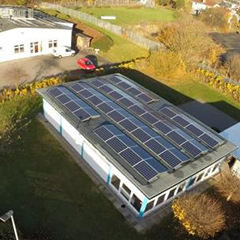-Traditional bakery cuts back electricity costs using solar power system from Q CELLS modules with approx. 100 kW output
-Share in self-consumption over 80 percent
-Solar self-consumption remains sensible for industrial and commercial companies now and in the future
[Neustadt / Thalheim, Germany, 23/02/2015] – The Germany-based bakery and confectionery company Seßelberg-Betriebs-KG relies on self-consumption of solar power. The company from the North German town of Neustadt/Holstein-Ostsee, started operating two PV plants with a total output of 99.5 kilowatt-peak on the roofs of the administrative buildings and baking facilities several weeks ago, as announced by the bakers’ guild member and Hanwha Q CELLS today. The Seßelberg bakery is using the rooftop solar applications, constructed of Q CELLS modules, to reduce its operating costs. The self-consumption systems produce around 81,000 kilowatt hours of clean energy a year. This is enough to power about 20 homes yearly. The bakery uses over 80 percent of the total amount of electricity to run its baking facilities and for supplying power to its administrative buildings. In other words: even without a storage system, the plant still achieves a very high share in self-consumption. Plus, CO2 emissions are reduced by approx. 50 tons. The international PV supplier delivered around 400 high-performance Q CELLS Q.PRO G-3 solar modules of the 250 watt-peak (Wp) power class. The plant was constructed by installation company dibu energie, Jan Bruhn.
25 percent savings on electricity as a cost factor
Hanwha Q CELLS is supporting commerce and industry in cutting their electricity costs and in taking an active role in climate protection. The project in the German federal state of Schleswig-Holstein is yet another example. Master baker Andreas Seßelberg owns the plant and says, “For me, it’s about energy optimization. And about making baked goods using the energy of the sun.” Seßelberg, who holds a degree in Trade Business Administration, goes on to say, “We save 25 percent of the electricity costs in the long run.” Jan Bruhn, owner of dibu energie, headquartered on the island of Fehmarn says, “We chose to partner up with Q CELLS, because the quality is right. Getting ahead through innovation is more important than ever today.”













